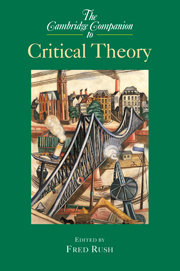Book contents
- Frontmatter
- Introduction
- 1 Conceptual foundations of early Critical Theory
- 2 Benjamin, Adorno, and the decline of the aura
- 3 The dialectic of enlightenment
- 4 The marriage of Marx and Freud
- 5 Dialectics and the revolutionary impulse
- 6 “The dead speaking of stones and stars”
- 7 Critique, state, and economy
- 8 The transcendental turn
- 9 The politics of Critical Theory
- 10 Critical Theory and the analysis of contemporary mass society
- 11 Critical Theory and poststructuralism
- 12 The very idea of a critical social science
- 13 A social pathology of reason
- Select bibliography
- Index
12 - The very idea of a critical social science
a pragmatist turn
Published online by Cambridge University Press: 28 May 2006
- Frontmatter
- Introduction
- 1 Conceptual foundations of early Critical Theory
- 2 Benjamin, Adorno, and the decline of the aura
- 3 The dialectic of enlightenment
- 4 The marriage of Marx and Freud
- 5 Dialectics and the revolutionary impulse
- 6 “The dead speaking of stones and stars”
- 7 Critique, state, and economy
- 8 The transcendental turn
- 9 The politics of Critical Theory
- 10 Critical Theory and the analysis of contemporary mass society
- 11 Critical Theory and poststructuralism
- 12 The very idea of a critical social science
- 13 A social pathology of reason
- Select bibliography
- Index
Summary
When I initially embarked on this chapter, I mentioned it to a well-known scholar of the Frankfurt School of Critical Theory. His response was “That is indeed a risky venture.” This attitude is probably fairly typical. The idea of a critical social science is, at best, unclear and, at worst, invested in a variety of outdated philosophical commitments of the early Frankfurt School. As Axel Honneth says in his contribution to this volume, many of the original ideas of this school seem, at least at first glance, to be “antiquated, dusty, and irretrievably lost.”
Frankfurt School can be retrieved. My approach will be to take up the claim of the early Critical Theorists that they provided a philosophical basis for a systematic orientation to social science. To use more recent terminology, they imagined that their work constituted a “research program” or “research tradition” of a distinctive, critical sort. My argument is that this tradition can, when appropriately revised, constitute a defensible, critical social science. The necessary revisions come from two sources, one internal and the other external. The first is Habermas’s work after Knowledge and Human Interests, when he began developing the idea of communicative rationality as the ontological centerpiece of Critical Theory. It will hardly come as news to anyone to say that this turn constituted a substantial revision of the Frankfurt tradition. But what has not been adequately teased out is how this clear ontological modification impacts the possibility of a critical social science.
- Type
- Chapter
- Information
- The Cambridge Companion to Critical Theory , pp. 310 - 335Publisher: Cambridge University PressPrint publication year: 2004
- 11
- Cited by



